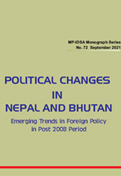Nepali PM’s Historic India Visit
Research Fellow, Manohar Parrikar IDSA, Dr Nihar R. Nayak’s article ‘Nepali PM’s historic India visit’ has been published in the Nepali English daily ‘The Annapurna Express’ on 10 April 2022.
Although PM Deuba stayed in India for under 72 hours, the visit was well received by people of both the countries. During their joint press briefing, both leaders acknowledged fruitful discussions on wide-ranging issues. They reviewed progress in implementation of Indian projects in Nepal and agreed to further deepen and facilitate trade, energy, investment, and connectivity ties. In another major achievement of the visit, India acknowledged Nepal as one of the main pillars of its ‘neighborhood first’ policy, says Dr Nayak.










